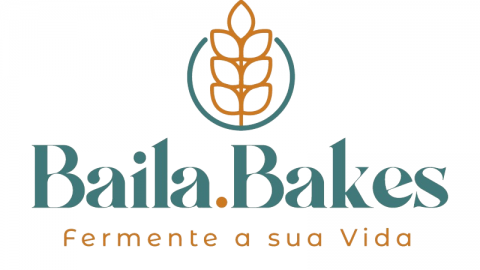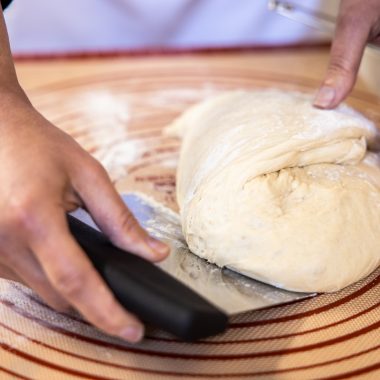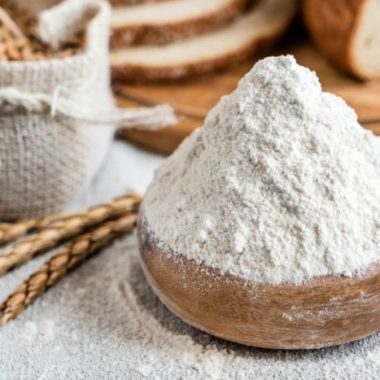When we learn something new, we come across a lot of new words. With bread it is no different. So, before we get our hands dirty, it's always good to stay on top of the most used terms. That's why I created a ABC or artisanal bread glossary, with many terms used in natural fermentation breads.
ABC of Bread. A glossary of artisanal bread
Check out the most commonly used terms below. However, this is ongoing work and you can contribute. If you miss a term, leave your suggestion in the comments.
- Autolysis: The process of mixing only flour and water. Only these two ingredients, before adding the levain, salt or making folds. It can last from 10 minutes to several hours. Increases dough extensibility and initiates gluten development.
- Alveoli: Cavities in the crumb of bread resulting from carbon dioxide bubbles created during fermentation.
- Bassinage: a French technique of gradually increasing the hydration of bread. Usually a small amount of water is added with the salt. Help in the development of gluten and bread structure.
- Bannetton: Fermentation baskets used in secondary or final fermentation
- Dough folds: the act of manipulating dough to develop gluten. There are several types of folds that are suitable for different types of dough.
- Primary fermentation: the starting signal for primary fermentation is the addition of levain to the flour and water. The duration depends on several factors such as temperature, hydration of the dough, amount of levain, among others.
- Elasticity: ability of dough to return to its original size after being rolled out or stretched.
- Extensibility: Ability of dough to stretch.
- Bench Rest – rest from 15 to 30 minutes for the dough to rest between pre-shaping and shaping. Thus, the dough regains its extensibility for final shaping.
- natural yeast: Yeast in the wild along with lactobacilli create a culture. It is used as a rising agent in breads and other products. It has several names: levain, pasta madre, sourdough starter, lievito madre.
- Hydration: proportion of liquids in the dough in relation to the total flour.
- Lamination: Technique used to develop the gluten and give strength to the dough. It consists of rolling out the dough completely on a surface and then folding it several times over itself. It is also used to add ingredients to dough such as seeds.
- Levain: synonymous with natural yeast. However, the term is also used for pre-yeast created to be used in a specific bread. This pre-yeast is created using one part natural yeast (bait) and parts flour and water.
- Yeast: a microorganism that is part of the fungi kingdom. Saccharomyces cerevisiae is the yeast most used for the fermentation of bread, fuel alcohol and beverages such as wine and beer.
- core: Inner part of the bread. It reveals a lot about the quality of the bread, the development of fermentation. generally, you want a crumb well aerated and full of alveoli.
- Final modeling: It is the act of giving the final shape to the bread. After the final molding, the bread undergoes the second fermentation. In the case of natural fermentation breads, it is usually in a cooled environment,
- Eyelash (Ear): is the name given to the flap that forms in the crust of bread during baking. Before going into the oven, the dough, still raw, is cut. Thus, the eyelash occurs through mass growth when in contact with high temperature.
- Pre-modeling: technique of handling the dough into a ball to facilitate final shaping. It also contributes to a crumb with better distributed alveoli.
- Veil point: Point in the dough where the gluten is well developed, creating a transparent, cohesive and extensible membrane.
- Cooling: cooling period of the bread, before being consumed. It may take 1 to 2 hours.
- Sourdough: English term used for natural fermentation bread. Literally, it means "sour dough".














Uau, você sabe muuuito. Valeu obrigada ❤️❤️❤️
Obrigada, Vanilda. Que bom que gostou!